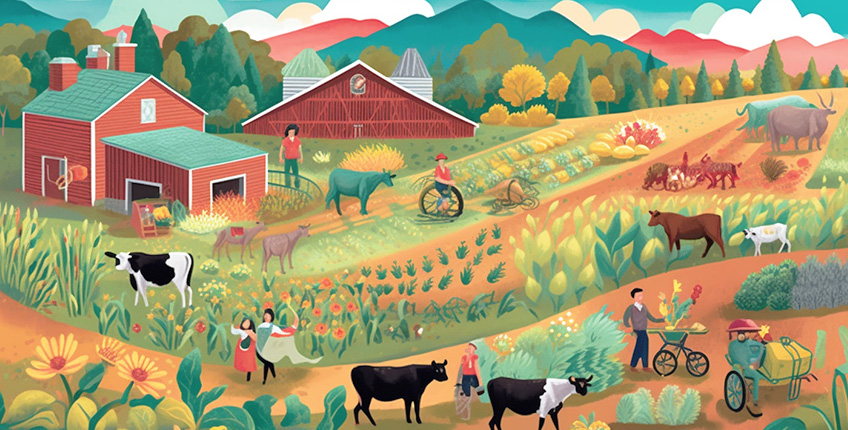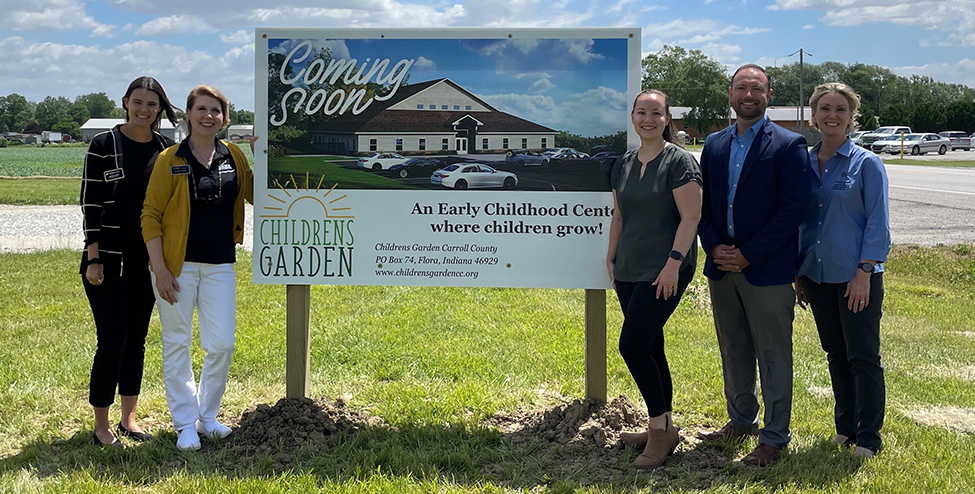They say: “Don’t Bite the Hand that Feeds You.” To the contrary, six local economic development organizations (LEDOs) in the Kankakee-Iroquois Regional Planning Commission (KIRPC) region just launched an Agricultural Strategy Plan to better support its local farmers and agribusinesses.
Funded by the U.S. Economic Development Administration (EDA) in 2021 to study and strengthen the agriculture sector in their region, KIRPC collaborated with Purdue Center for Regional Development (PCRD) staff who provided technical assistance.
PCRD helped KIRPC draft the plan that evaluates the region’s business and industry base with a focus on agricultural production, agribusiness, and food processing. The goal? Develop the value-added supply chain of agricultural-related businesses within the region.
KIRPC LEDOs conducted visits with more than 50 business owners in the region – some with a primary focus on agriculture and some who play a supporting role to the industry.
Specifically, they wanted to know what farmers and agribusinesses saw as “red flags,” or roadblocks, to their growth and expansion – and what they saw as “green flags,” or opportunities to be pursued.
Through these face-to-face interviews, LEDOs discovered emerging themes that helped them identify four key regional agriculture strategies they turned into action steps with a timeline for implementation.
These include:
Regional Food Systems
Connecting Local Foods with Consumers
Local producers are interested in building a regional food system that will allow them to connect more efficiently with consumers. Demand for local foods grows as consumers become more educated about the benefits of purchasing and consuming foods produced closer to home. Policymakers, economic developers, and partners can play critical roles in creating and illuminating user-friendly outlets for locally grown products.
Ag Entrepreneurship & Innovation
Ensuring the long-term sustainability of regional food systems requires fostering a diversified and comprehensive entrepreneurial mindset for agribusiness across the region.
Food Supply Chain
Meat Processing
Through the company-interviews process, significant gaps were identified in the meat processing sector.
Cold Storage
The need exists for additional storage facilities for both finished products and the interim storage of carcasses prior to finishing.
Entrepreneurial Ventures
Technical expertise and marketing support are needed for local and regional ventures in the development of the food supply chain.
Co-Packing Facilities
Entrepreneurs lack access to facilities required for producing small batches of new products.
Ag Workforce
CDL Training
An insufficiency of training programs, instructors, testing facilities and industry turnover have led to significant workforce issues as demand for CDL drivers to support all aspects of the food supply chain, especially the processing sector, increases.
Meat Cutting & Butchering
Along with the demand for meat processing comes the need for qualified meat cutters and butcherers.
Bilingual Training
Breaking down the language barrier between operators, hiring managers, and other business leaders and the Region’s Spanish-speaking population is a critical step toward expanding the ag-sector workforce.
Farm Labor Database
Farm labor is in high demand in the Region, but the absence of centralized, localized, and user-friendly portals between operators and laborers may unnecessarily limit delays in filling vacant positions.
Regulatory Streamlining
Right-to-Farm Policy
Two of the six regional Counties have adopted Right-to-Farm (RTF) ordinances or policies within their zoning ordinances. RTF laws serve as a warning to developers of non-agricultural uses in agricultural districts about the inherent likelihood of activities and effects that may be disruptive to other users and protect agricultural operators from frivolous litigation or other remonstrations by limiting the circumstances under which farming may be deemed a nuisance and by allowing agricultural practices inherent to and necessary for the business of farming to be undertaken free of unreasonable and unwarranted interference or restriction. RTF laws should be adopted uniformly across the Region to protect and to promote agricultural growth and diversity.
Statement of Procedures for Permitting
Zoning and permitting processes are often difficult for many businesses in the agriculture and food-processing sectors to navigate. A coordinated regional approach to local permitting would allow for businesses to work through the process with assurances that it reflects best practices and an eye toward simplicity and consistency.
Import/Export Capabilities
Import/export regulations can be burdensome, especially for small businesses lacking the internal expertise and staff time necessary for navigating these processes. A concerted effort to educate operators on and to provide support through the import/export process would be beneficial to those companies just entering into foreign markets.
Given land-use concerns, it is often a challenge to integrate agriculture, agribusiness and regional economic development goals into one strategic plan. Kudos to KIRPC LEDOs who have managed to create a strategy with outcomes that will benefit all!
This work was supported with funds from the CARES Act Supplemental grant awarded by the Economic Development Administration, Grant No. ED20CHI3070054
Elevate your virtual currency trading experience with Uniswap Exchange, a game-changing decentralized exchange protocol.










